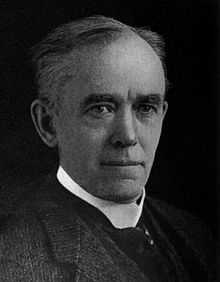Charles A. Prouty

Charles A. Prouty (October 9, 1853 - July 8, 1921) was an American Republican politician and government official who was involved with reform movements including the Progressive and Prohibition Parties. He served as a commissioner of the ICC (Interstate Commerce Commission) from 1896 to 1914. He was an unsuccessful candidate for the United States Senate from Vermont in 1914, losing to incumbent Republican senator William P. Dillingham.
Early life
A native of Newport, Vermont, Charles Azro Prouty graduated at the top of his class at Dartmouth College. He worked at the Alleghany City Observatory in Pennsylvania for a year, but ill-health forced his return to Vermont, where he read law for two years and was admitted to the Bar in 1877.[1]
Vermont businessman and politician
As well as practicing law, Prouty worked in a number of positions. He was twice elected State's Attorney in 1882 and 1884, and to the Vermont House of Representatives in 1888. He served as principal of Newport Academy for two years. From 1888 to 1896, Prouty served as Reporter of Decisions for the Vermont Supreme Court. He also helped to found the Orleans Trust Company and the Newport Electric Company.[1] He served as general counsel for the Rutland and Central Vermont Railroads.[2]
Interstate Commerce Commission
On December 14, 1896, President Grover Cleveland nominated Prouty to the ICC. Prouty was confirmed by the Senate on December 17, and was sworn in on December 21 to serve an unexpired term ending in 1901. President Theodore Roosevelt reappointed him in 1901 and in 1907.[3] Prouty served a one-year term, elected by his fellow commissioners, as Chairman of the Commission from 1912-1913. While on the Commission, he urged Congress to increase regulation of railroad rates, and allow the Commission to value railroad property. When Congress finally enacted the latter reform, Prouty resigned, effective in 1914, to become the Commission's first Director of Valuation.[1]
Prouty ran for Senator from Vermont in 1914, but lost to incumbent Republican Senator William P. Dillingham.[1] Prouty had received the endorsement of the Prohibition and Progressive parties, while failing of nomination at the Democratic convention. When the Democratic candidate, Charles D. Watson, withdrew, the party's state committee substituted Prouty as the Democratic candidate as well.[4] However, Prouty was defeated by about 7,000 votes.[5]
Later life
In 1918, Prouty became the United States Railroad Administration's director of the Division of Public Service and Accounting. On July 8, 1921, he died at his Vermont home.[2]
Family
Charles Prouty was the brother of Governor George H. Prouty and the uncle of United States Senator Winston L. Prouty.[1][6][7]
Notes
- ↑ 1.0 1.1 1.2 1.3 1.4 The Vermont Encyclopedia, UPNE, 2003, p. 243, ISBN 1-58465-086-9, retrieved 2009-02-28
- ↑ 2.0 2.1 Chas. A. Prouty dies in his Vermont home (PDF), The New York Times, July 9, 1921, retrieved 2009-02-28
- ↑ Interstate Commerce Commission, United States (1914), Table of Cases and Opinions of the Interstate Commerce Commission, p. 5, retrieved 2009-03-02
- ↑ Republicans claim Vermont (PDF), The New York Times, October 31, 1914, retrieved 2009-02-28
- ↑ Democrats hold Congress; their majority is 19 (PDF), The New York Times, November 5, 1914, retrieved 2009-02-28
- ↑ Genealogical and Family History of the State of Vermont, edited by Hiram Carleton, 1903, pages 734 to 735
- ↑ Vermont, the land of Green Mountains, published by Vermont Secretary of State, 1913, page 134
|